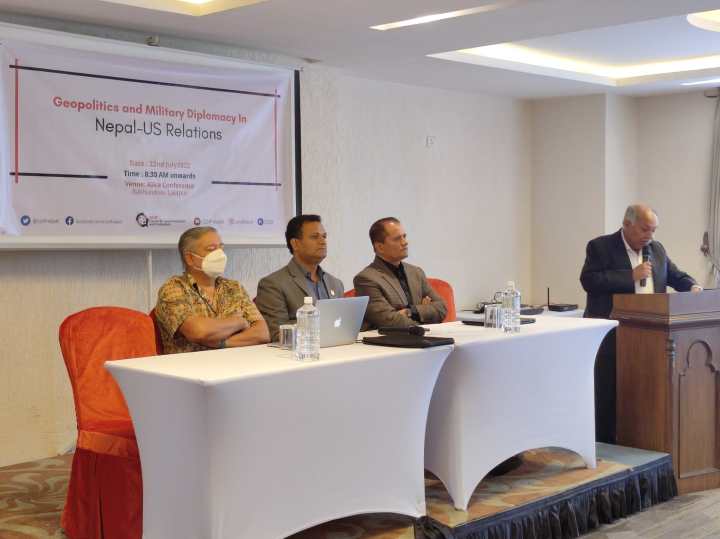Kathmandu: Independent experts and political observers have suggested that Nepal should maintain balanced relations with major global powers, at a time the global geopolitical contestations are increasingly taking an ugly turn.
They made such recommendations during a seminar on ‘Geopolitics and Military Diplomacy in Nepal-US Relations’ organized by Center for Social Inclusion and Federalism (CESIF), a research think tank based in Kathmandu, on Friday in Kathmandu.
Addressing the seminar Gaurav Shumsher Jung Bahadur Rana, former Nepal Army chief, said that while the military is known as a hard power tool, it can also be used as a soft power tool to achieve broader foreign policy objectives.
Chairperson of Janata Samajbadi Party and Former Foreign Minister Upendra Yadav mentioned that Nepal must abide by its non-alignment policy and reject proposals for military partnership with foreign countries.

Dr Deepak Prakash Bhatt mentioned that military diplomacy is a very relevant topic in the discourse in present context when the world continues to change geopolitically. Former Major General of Nepal Army, Purna Bahadur Silwal, who is also the author of Nepal’s Instability Conundrum: Navigating Political, Military, Economic and Diplomatic Landscape, said that strong military ties between the two countries [Nepal and the US] can be leveraged to achieve broader foreign policy objectives.
Speaking in the seminar, Dinesh Bhattarai, foreign policy expert who served as the foreign affairs advisor to Nepal’s prime ministers in the past, mentioned that Nepal is caught in a geopolitical maneuvering between global powerhouses like US and China and their conflict for hegemony.

Similarly, Dr Suresh Chalise, Former Ambassador to the US and UK, said that US involvement in Nepal has been influenced by its regional interests. “To protect its sovereignty, Nepal should confine its relationship with the US to strictly bilateral,” he said.
Meanwhile, senior journalist Ajay Bhadra Khanal, who is also the Research Director at CESIF, mentioned that the US has used investments as a tool for diplomatic relations and political influence. “With growing geopolitical interests of powerhouses, Nepal will face increasing pressure in the future,” he said.
Nepal has seen rampant politicization and fabrication of issues regarding Nepal-US relations, especially concerning Millennium Challenge Corporation (MCC) Compact and State Partnership Program (SPP), which eventually led to questioning Nepal’s diplomatic practices and capacity, according to CESIF.
The CESIF, in its press statement, said that it held the seminar on the topic realizing the need for a discussion on Nepal-US relations and the role of military cooperation within.
The seminar consisted of two sessions.

The first session held on ‘Military Diplomacy of Nepal’ consisted of the panel involving Gaurav Shumsher Jung Bahadur Rana, Former Chief of Nepal Army, Upendra Yadav, Chairperson of Janata Samajbadi Party and Former Deputy Prime Minister and Minister of Foreign Affairs, Deepak Prakash Bhatt, Member of the House of Representative and Member of Foreign Affairs Committee in the Lower House and Purna Bahadur Silwal, Major General (Retd) of Nepal Army.

The second session on ‘Geopolitics and Nepal-US Relations’ consisted of the panel involving Dinesh Bhattarai, Former Foreign Affairs Advisor to Nepal’s Prime Ministers, Dr Suresh Chalise, Former Ambassador to the US and UK, Ajaya Bhadra Khanal, Senior Journalist and Research Director at CESIF and Mamta Siwakoti, lawyer and researcher.














Comment